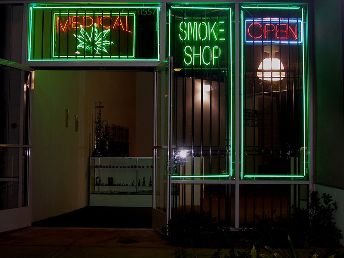The Los Angeles City Council spent seven hours Tuesday trying to thrash out agreement on an ordinance to regulate medical marijuana dispensaries in the city. It didn't quite get there, but it made some progress.
As 2009 winds down, we are taking a look at all the legislation related to drug policy around the country. Two weeks ago we looked at federal legislation, and last week at medical marijuana bills in the states. This week it's state marijuana decriminalization and legalization bills -- if we missed any, let us know.
Do you read Drug War Chronicle? If so, we need your feedback to evaluate our work and make the case for Drug War Chronicle to funders. We need donations too.
The carnage continues. This week an American citizen is among the casualties, but it looks like she was the victim of a soldier's inadvertent discharge.
A sticky-fingered North Carolina deputy gets busted, so does a Florida sheriff's evidence tech, and a home-invading, drug dealer-robbing Philly cop gets sent away for a long, long time.
Israel is one of the few countries that allows for medical marijuana use, and this week saw forward movement on a couple of important fronts.
The Vancouver NAOMI study showed that heroin maintenance worked for some hard-core addicts not amenable to methadone or other forms of drug treatment. But now, plans to build on NAOMI with further research in Vancouver and Montreal have hit a snag, with the Quebec provincial government refusing to pay its share.
Under United Kingdom drug laws, simple pot possession can cost you two years in gaol. But that's rarely the case, and now the Scottish government is hinting that a small fine may be a more reasonable response -- and one that saves a lot of policing time.
Chakib El Khayari runs a human rights group in Morocco's Rif Mountains, where marijuana cultivation is a way of life. He has run afoul of the Moroccan government for criticizing its policies toward the poor pot farmers, and an appeals court has just ruled he should stay in a jail. Human rights and drug reform groups consider him a prisoner of conscience.
"Legal Marijuana: It's Coming, Whether You Like it or Not," "The Difference Between Drug War Violence and 'Drug-Related' Violence," "The Staggering Incoherence of Drug Warrior Charles Grassley," "Cory Maye: Drug War Victim Gets a New Trial," "Will Foster is Free! He Walked Out of Prison in Oklahoma Today."
The Los Angeles City Council Tuesday voted to allow medical marijuana dispensaries to continue to sell their products, but failed to reach a final vote on a medical marijuana ordinance that has been years in the works. The council will return to the ordinance at its December 2 meeting.

medical marijuana dispensary, Ventura Blvd., LA (courtesy wikimedia.org)
Observers had hoped the council might pass the ordinance Tuesday, but progress was derailed by contentious debate over the sales issue. LA City Attorney Carmen Trutanich and LA County District Attorney Steve Cooley had called for an outright ban on medical marijuana sales, saying that under their reading of the state's medical marijuana laws and court decisions, sales are not allowed. Cooley has threatened to prosecute dispensaries no matter what the city council does.
Council members, caught between fear of legal problems for the city and the expressed desire of constituents for safe access to medical marijuana, had some harsh words for prosecutors. Councilmen Ed Reyes, who has been the principal in trying to write the ordinance, protested that the City Attorney's Office was trying to impose "a political view that has nothing to do with objective advice."
He wasn't the only one. "I think we're getting advice from one direction," said Councilman Paul Koretz. "I would like to see the City Attorney work with us to help us get to where we want to be."
In the end, the council rejected the advice of the prosecutors, instead adopting an amendment that would allow for "cash contributions, reimbursements and payments for actual expenses of growth, cultivation, and provision [...] in accordance with state law."
"We have some very elegant and flexible language that will adjust as state law is defined," said Council President Eric Garcetti.
While the council did not succeed in passing the ordinance, it did make substantial progress. In the seven-hour-long session, it dealt with more than 50 proposed changes to the ordinance. Among other amendments considered was one by council members Koretz and Reyes that would have required police to get a court order to review dispensary records. After Councilman Jose Huizar and other members objected, saying the amendment would hamper efforts to weed out "bad" dispensaries, the amendment failed.
Reyes introduced an amendment eliminating the ordinance's requirement that dispensaries have no more than five pounds of marijuana on hand and grow it on-site, but Huizar objected, saying it would encourage a black market and was "a dangerous path."
"I'm not advocating for the black market, gangs, cartels to take advantage of this," Reyes retorted, "but we can't choke it to the point where it does not function." Then, Reyes withdrew his amendment, asking Huizar to draft an alternative.
The council also approved an amendment limiting patients and caregivers to membership in one collective, but with a provision allowing for emergency purchases. That didn't go over well with medical marijuana advocates, who complained that it would limit access for patients.
The council also adopted a series of amendments from Councilman Koretz, based on West Hollywood's ordinance regulating dispensaries. Those amendments require dispensaries to have unarmed security guards patrolling a two-block area, to deposit cash daily, and to provide contact information to police and neighbors within 500 feet.
The council squabbled over a number of amendments that sought to micro-manage the dispensaries, ranging from a $100,000 salary cap to restrictions on doctors writing recommendations. "This industry is rife with people ripping off money from people who are seriously ill," said Councilman Ricardo Alarcon, who offered the salary cap amendment. "We ought to cap compensation because I believe it will be abused, people will be making millions.
Those amendments excited the wrath of Councilwoman Janice Hahn."We're going too far from what we need to be doing," Hahn said with some exasperation. "Now you're going after compensation, you're going after the doctors writing these notes. If you take the logic that people in compassionate professions shouldn't be making more than $100,000, we could go after every doctor in this city. This is not what we're here for, which is to regulate these dispensaries to make sure people have safe access," she said to loud cheers from the audience. "Let's stay focused."
In the end, Alarcon withdrew his amendment. City staff will instead review compensation standards for non-profit organizations and return to the issue later.
After heated debate, the council also deferred action on two contentious issues: a cap on the number of dispensaries to be allowed, and location restrictions that would bar dispensaries from operating within either 500 or 1000 feet of schools, parks, and other child-friendly locations. The council asked city officials to return next week with studies on caps and maps that would demarcate what areas within the city would be okay for dispensaries. Councilmember Reyes displayed one such map at the hearing, arguing that the location limits would dramatically restrict the areas where dispensaries could operate.
While the ordinance anticipates setting a cap on the number of dispensaries at 70, or one for every 57,000 residents, there were indications during the debate that members could go for a cap as high as 200, but even that would reduce the number of dispensaries in the city by 80%.
"We're fairly pleased by the progress that has occurred in the council over the past week or so, and we're certainly pleased the city decided to allow sales of medical marijuana," said Kris Hermes, spokesman for Americans for Safe Access (ASA), the nation's largest medical marijuana advocacy group. "We are concerned that any limit on dispensaries not be an arbitrary cap, and that the council decide on based on what patients need and where they need it."
ASA's Hermes said there was still work to be done, especially on the issue of a cap on the number of dispensaries. "There are a few more days left yet to lobby the council and urge them to move ahead cautiously in the area of capping or limiting the number of dispensaries," he said. "If the demand is there, there should be sufficient facilities to meet that demand. Unfortunately, I don't think that's the way the council's going."
There are currently an estimated one thousand dispensaries in Los Angeles. There were four when the council began working on an ordinance way back in 2005. There were 186 when the council voted to institute a moratorium two years later.
The City Council will return to the medical marijuana ordinance at its December 2 meeting.
back to top
Thirteen states have decriminalized marijuana possession so far; none have legalized it. This year, marijuana legalization bills have been filed in two states -- California and Massachusetts -- and decriminalization bills -- loosely defined -- were introduced in six states and passed in one, Maine. In Virginia, a bid to create a new marijuana offense was defeated.

press conference for California AB 390 hearing -- Assemblyman Ammiano at right
We have tried to create a comprehensive list of marijuana reform legislation in the states -- not medical marijuana, we did that
last week -- but we can't be absolutely certain we've covered everything. If you know of a bill we missed, please
email us with the details and we'll add it to the list. (We compiled this list from our own coverage and a variety of other sources. The Marijuana Policy Project's
state pages were especially useful.)
California: San Francisco Assemblyman Tom Ammiano (D) introduced a landmark legalization bill, the Marijuana Control, Regulation, and Education Act, AB 390, in March. Under the bill, the state would license producers and distributors, who would pay an excise tax of $50 per ounce, or about $1 per joint. Anyone 21 or over could then purchase marijuana from a licensed distributor. The bill also would allow any adult to grow up to 10 plants for personal, non-commercial use. AB 390 got a hearing before the Assembly Public Safety Committee in October, but has not moved since.
Connecticut: Senators Martin Looney (D-New Haven), the Senate Majority Leader, and Toni Harp (D-New Haven), chair of the Senate Appropriations Committee, introduced a marijuana decriminalization bill, SB 349, in January. It would have made possession of less than half an ounce an unclassified misdemeanor with a maximum $250 fine. The measure passed the Joint Judiciary Committee in March on a 24-14 vote, but it was filibustered to death in the Senate Finance Committee by Sen. Toni Boucher (R-New Canaan) in May.
Maine: The legislature passed in March and Gov. John Baldacci (D) signed in May LD 250, which increases the amount of marijuana decriminalized in the state to 2.5 ounces. Previously, possession of up to 1.25 ounces was a civil offense, punishable by a fine of up to $1,000, but possession of between 1.25 and 2.5 ounces was a misdemeanor that could get one six months in jail. Unfortunately, the bill also increased the penalty for possession of more than eight ounces from six months and a $1,000 fine to one year and a $2,000 fine.
Massachusetts: -- At the request of former StoptheDrugWar.org and NORML board member Richard Evans, Rep. Ellen Story (D-Amherst) introduced another landmark legalization bill, AN ACT TO REGULATE AND TAX THE CANNABIS INDUSTRY -- H 2929, that would remove marijuana offenses from the criminal code and allow for the licensed production and sale of marijuana. The bill was assigned to the Joint Committee on Revenue, where it got a public hearing in October.
Montana: A marijuana decriminalization bill, HB 541, was introduced by Rep. Brady Wiseman (D-Bozeman). It would have made possession of up to 30 grams a civil infraction punishable by only a $50 fine. Under current law, that same amount can get you up to six months in jail and a $500 fine. The bill got a House Judiciary Committee hearing in March, but failed to get out of committee on a straight party-line 9-9 vote.
New Hampshire: In January, Rep. Steven Lindsey (D) introduced a bill that would decriminalize the possession of less than an ounce of marijuana. Under the bill, HB 555, persons over the age of 18 would face no more than a $100 fine. Simple possession would also be decriminalized for minors, but they would be subjected to community service and a drug awareness program at their own expense or face a $1,000 fine. While the House passed a similar measure last year (it died in the Senate), this year the bill never made it out of committee. The House Criminal Justice and Public Safety Committee deemed it "inexpedient to legislate" in February.
Rhode Island: In July, as the General Assembly rushed to adjourn, the Senate approved a resolution introduced that same day to create a nine-member commission to study a broad range of issues around marijuana policy. The resolution, which did not require any further approval, set up a "Special Senate Commission to Study the Prohibition of Marijuana," which is charged with issuing a report by January 31. The panel met for the first time last week.
Tennessee: -- A bill, SB 1942, that would have made possession of less than an eighth of an ounce of marijuana a Class A misdemeanor punishable by a fine of between $250 and $2500 died after being deferred by the Senate Judiciary Committee in May. Companion legislation, HB 1835, met a similar fate in the House Judiciary Committee's Subcommittee on Criminal Practice and Procedure in March.
Vermont: Led by Rep. David Zuckerman (P-Burlington), 19 members of the Vermont legislature introduced in February a bill that would decriminalize the possession of up to an ounce of marijuana. Under the bill, HB 150, small-time possession would have become a civil infraction with a maximum $100 fine. But the bill was assigned to the House Judiciary Committee, where it has languished ever since.
Virginia: It was not decriminalization but increasing marijuana penalties that was on the agenda in the Old Dominion. Delegate Manoli Loupassi (R-Richmond) introduced HB 1807, which would create a new felony offense for people caught transporting more than one ounce but less than five pounds of marijuana into the state. The bill was filed in January and sent to the Committee on Courts of Justice, where it died upon being "Left in Courts of Justice" on February 10.
Washington: A bill, S 5615, that would decriminalize the possession of small amounts of marijuana was introduced in January and approved by the Senate Judiciary Committee a week after a public hearing in February. It then went to the Senate Rules Committee, where it stalled. A companion bill in the House, HB 1177, was referred to the House Committee on Public Safety & Emergency Preparedness, which effectively killed it by refusing to schedule it for a hearing before a legislative deadline in March.
back to top
Do you read Drug War Chronicle? If so, we'd like to hear from you. DRCNet needs two things:
- We are in between newsletter grants, and that makes our need for donations more pressing. Drug War Chronicle is free to read but not to produce! Click here to make a donation by credit card or PayPal, or to print out a form to send in by mail.
- Please send quotes and reports on how you put our flow of information to work, for use in upcoming grant proposals and letters to funders or potential funders. Do you use DRCNet as a source for public speaking? For letters to the editor? Helping you talk to friends or associates about the issue? Research? For your own edification? Have you changed your mind about any aspects of drug policy since subscribing, or inspired you to get involved in the cause? Do you reprint or repost portions of our bulletins on other lists or in other newsletters? Do you have any criticisms or complaints, or suggestions? We want to hear those too. Please send your response -- one or two sentences would be fine; more is great, too -- email [email protected] or reply to a Chronicle email or use our online comment form. Please let us know if we may reprint your comments, and if so, if we may include your name or if you wish to remain anonymous. IMPORTANT: Even if you have given us this kind of feedback before, we could use your updated feedback now too -- we need to hear from you!
Again, please help us keep Drug War Chronicle alive at this important time! Click here to make a donation online, or send your check or money order to: DRCNet, P.O. Box 18402, Washington, DC 20036. Make your check payable to DRCNet Foundation to make a tax-deductible donation for Drug War Chronicle -- remember if you select one of our member premium gifts that will reduce the portion of your donation that is tax-deductible -- or make a non-deductible donation for our lobbying work -- online or check payable to Drug Reform Coordination Network, same address. We can also accept contributions of stock -- email [email protected] for the necessary info.
back to top
by Bernd Debusmann, Jr.
Mexican drug trafficking organizations make billions each year trafficking illegal drugs into the United States, profiting enormously from the prohibitionist drug policies of the US government. Since Mexican president Felipe Calderon took office in December 2006 and called the armed forces into the fight against the so-called cartels, prohibition-related violence has killed over 12,000 people, with a death toll of over 5,000 so far in 2009. The increasing militarization of the drug war and the arrest of several high-profile drug traffickers have failed to stem the flow of drugs -- or the violence -- whatsoever. The Merida initiative, which provides $1.4 billion over three years for the US to assist the Mexican government with training, equipment and intelligence, has so far failed to make a difference. Here are a few of the latest developments in Mexico's drug war:

Ciudad Juárez (courtesy Daniel Schwen, Wikimedia)
In Ciudad Juárez, four policemen were killed and two were wounded in two separate incidents. According to a spokesperson for the state Department of Public Safety, unknown gunmen killed two undercover officers after opening fire on their care. Several hours later, gunmen attacked a police patrol, killing two and wounding two. A gas station attendant caught in the crossfire was also killed.
Friday, November 20
In Chicago, 15 alleged members of a "command and control" groupof La Familia were indicted by federal authorities. These arrests come a month after 300 alleged members of the cartel's US distribution network in the US were arrested in a nationwide sweep. The group in Chicago had, since at least 2007, been taking orders from unidentified cartel bosses in Mexico collected approximately $20 million. 550 pounds of cocaine and $8 million in cash were seized when the arrests were made.
Monday, November 23
The mayor of a wealthy suburb of Monterrey has sent his family out of the country for their protection as he campaigns against organized crime. Mayor Mauricio Fernandez of San Pedro Garza Garcia made headlines last week when he publicly announced the death of a kidnapper hours before his body was found by police. He has also suggested using groups that operate outside of the law to combat crime, and is planning to form his own intelligence network of civilians and police.
In Tijuana, five men were killed in different incidents. One of the men was found inside a residence with a gunshot wound to the head. In another incident, a man with his hands and feet tied with extension cords was found inside a burning truck. No arrests were made in any of the murders.
In Guerrero, at least six people were killed in drug related violence throughout the state. During the same 24 hour period, at least 12 people were killed in Sinaloa, 8 in Ciudad Juárez, and 2 in Chihuahua city.
Tuesday, November 24
In the state of Sinaloa, five bodies were found by the side of the Culiacan-Mazatlan highway. Among them was a relative of Jose Carillo Fuentes, who was head of the Juárez Cartel until dying in a botched plastic surgery in 1997. Eleven people were killed in Chihuahua, of whom 9 were killed in Ciudad Juárez. At least six people were killed in other incidents throughout Mexico.
In Matamoros, an American citizen, Lizbeth Marin, died after being wounded by gunfire. Initial reports indicate that she may have been shot when the weapon of a Mexican soldier was accidently discharged as he climbed into a vehicle. Another unidentified American woman of 54 years of age was found dead in a home in Tijuana Monday, bearing signs of blunt injuries and contusions to her neck, head and face.
In Colombia, an alleged member of the Sinaloa Cartel was arrested by Colombian intelligence agents in the city of Cali. Carlos Adolfo Garcia Yepes, aka El Chino, was apparently in charge of logistics and coordinating the seaborne traffic of cocaine from Colombia to Mexico, from which it was then smuggled into the United States.
Body Count for the Week: 158
Body Count for the Year: 6,738
Read the last Mexico Drug War Update here.
back to top
A sticky-fingered North Carolina deputy gets busted, so does a Florida sheriff's evidence tech, and a home-invading, drug dealer-robbing Philly cop gets sent away for a long, long time. Let's get to it:
In Whiteville, North Carolina, a local police officer was arrested Monday on drug trafficking charges. Gregory Campbell, 40, is accused of breaking into Fair Bluff Discount Drugs and stealing prescription opiates. He is charged with burglary, larceny of opium-based prescription medications, three counts of drug trafficking, and possession with intent to distribute the drugs. He was a Tabor City police officer from May until September, when he resigned to join the Fair Bluff Police Department. He was fired from that gig after being arrested Monday.
In St. Augustine, Florida, a St. Johns County Sheriff's Office evidence tech was fired and arrested Wednesday for stealing drugs. Paul Robinson, 38, went down after a departmental supervisor began investigating his paperwork and was told he was taking home pain relievers for his own use. He is charged with grand theft and official misconduct.
In Philadelphia, a former Philadelphia police officer was sentenced Monday to 30 years in federal prison for an attempted home-invasion robbery in Pottstown and the robbery of a major Philadelphia drug dealer. Former officer Malik Snell, 37, was convicted in June of robbery, attempted robbery, conspiracy to commit robbery, and using and carrying a firearm during the commission of a crime.
back to top
Sheba Medical Center in Tel Hashomer has become the first hospital in Israel to administer medical marijuana to patients, the Israeli newspaper Haaretz reported Tuesday. Some 20 patients have been treated with medical marijuana in a pilot program over the last six months, the newspaper reported.

Sheba Medical Center (courtesy Wikimedia)
Meanwhile, the
Jerusalem Post reported Wednesday that the Knesset's Labor, Social Affairs, and Health Committee had instructed the Health Ministry to finish its proposals for regulating medical marijuana use within four months. Such regulations should address the production, quality, and marketing of medical marijuana, as well as prevent diversion into non-medical markets, the committee instructed the ministry.
In Israel, people with cancer, multiple sclerosis or certain other conditions can apply for a license to receive a free supply of medical marijuana. It is provided by a charitable organization, Tikkun Olam, which supplies it to some 700 patients.
At Sheba Hospital, Ora Shamai, head nurse in the pain management program, has recently finished drafting a formal protocol for providing medical marijuana, another first for an Israel hospital. That draft has already been approved by the Health Ministry official in charge of approving medical marijuana treatments, Dr. Yehuda Baruch. The hospital is expected to soon approve the protocol.
Under the protocol, if doctors determine a patient needs marijuana, the doctor in charge of that patient's treatment will apply for the necessary permit from the ministry. Patients who can walk will be limited to smoking in the hospital's smoking room, while bedridden patients will only be allowed to smoke in private rooms with an open window.
"We make it clear to the staff that smoking medical marijuana doesn't endanger the medical staff on the wards," Shamai said. "It does not harm those in the area via passive smoking."
Doctors at Sheba downplayed any possible harm to patients from smoking marijuana on a limited basis. "It's certainly a dilemma, but it's the lesser of two evils," said Dr. Itay Gur-Arie, the head of Sheba's pain management unit. "When you're talking about smoking a joint or two a day, we don't think this causes short-term harm to the patients."
Sheba is also making use of vaporizers, machines that heat marijuana but don't ignite it, allowing patients to inhale vapors instead of smoke. The Israel Association for the Advancement of Medical Cannabis, which has been involved in the pilot program from the onset, is now raising money to buy more. The hospital currently operates five.
Along with Canada, Germany, Holland, and some American states, Israel has been a pioneer in accepting medical marijuana. With the Knesset action this week, Israel moves closer to setting up a regulated and expanded system. The Sheba hospital protocol is likewise on the cutting edge of medical marijuana acceptance by hospitals.
back to top
Fresh on the success of NAOMI, the North American Opiate Maintenance Initiative, in which hardcore heroin addicts in Vancouver were given either methadone, heroin, or Dilaudid in maintenance doses, Canadian researchers announced earlier this year plans to broaden and deeper their research with SALOME, the Study to Assess Long-term Opiate Maintenance Effectiveness. SALOME was supposed to begin this fall in Vancouver and Montreal, but Quebec provincial authorities have thrown a wrench in the works.

Hastings Street, on Vancouver's East Side (vandu.org)
reported this week that Quebec has balked on paying its share of the project, stopping the Montreal portion of SALOME in its tracks. The Vancouver portion, supported by the British Columbia provincial government, is set to move forth.
Quebec's refusal to pay its share -- the Canadian Institutes of Health Research are kicking in $1 million for the three-year project -- led Montreal's SALOME head researcher to charge the government with discrimination. The decision will have "disastrous consequences for people addicted to heroin and (who) don't respond to standard treatment," said Dr. Suzanne Brissette, chief of addiction medicine at Saint-Luc hospital. "There is no other treatment for these people."
NAOMI showed that heroin maintenance worked for people for whom methadone and other forms of treatment had not, she said. Had researchers found a treatment for cancer or diabetes, Quebec would not hesitate to help fund it, she added. "It's a clear case of discrimination," she said. "We have a treatment that works and they're saying, 'Sorry folks, you won't get it.'"
NAOMI researchers estimate that Canada has between 60,000 and 90,000 heroin addicts. The NAOMI trials found that addicts on maintenance heroin used less illicit heroin, committed fewer crimes, and adapted healthier lifestyles.
back to top
In a report released Wednesday, the Scottish government is recommending that small-time marijuana offenders simply be handed on-the-spot fines of $67. The fines, or "fixed penalty notices," are already in effect for a number of public nuisance offenses, such as public drunkenness, vandalism, and urinating in public.

Urquhart Castle on Loch Ness, Scotland (photo from Sam Fentress via Wikimedia)
Adding small-time marijuana offenses to the list won the support of 83% of police officers surveyed for the report. If adopted, the ticketing scheme would move Scottish practices closer to those in England or in limited parts of Scotland, where police officers have the option of issuing a warning to people caught smoking or in possession of small amounts of marijuana.
"This was felt to be a proportionate means of dealing with a minor offence which would also save a lot of police time," the report said.
Handing out tickets instead of arrests for public order offenses freed up nearly 22,000 hours of police officers' time, said Community Safety Minister Fergus Ewing. "It is right that anyone committing a serious crime should continue to be brought before a sheriff to face the full range of penalties available to the court," he said. "However for less serious offences, such as consuming alcohol in the street, these figures show that our police officers are punishing low-level antisocial behavior swiftly and effectively, hitting perpetrators in their pockets. This is swift and visible justice for those who commit acts of anti-social behavior in our communities and hits them in their pockets."
Under current United Kingdom drug law, marijuana is a Class B drug, with simple possession punishable by up to two years in prison. In practice, such harsh sentences are rarely imposed.
back to top
A Morrocan appeals court Tuesday rejected the appeal of a human rights activist who had publicly criticized the country's drug policy and was subsequently jailed for offending the authorities and alleged currency violations. That means Chakib El Khayari will continue to serve a three-year sentence handed down in June.

Chakib El Khayari
El Khayari heads a human rights group in the Rif Mountains, where marijuana growing has been a way of life for centuries. He had criticized inequities in the Moroccan government's crackdown on the cannabis industry there. El Khayari repeatedly told international conferences and foreign media outlets that he questioned the government's record on marijuana eradication and interdiction. He accused authorities of turning a blind eye to hashish smuggling to Europe while focusing their repressive efforts on poor farmers.
Prosecutors accused him of taking a bribe to focus a media campaign on some traffickers and not others. They also accused him of depositing money in foreign banks without approval from the country's Exchange Office. That charge was based on a payment he accepted for writing an article for a Spanish magazine. He was convicted in a court in Casablanca in June.
Even before his conviction, human rights and drug reform groups were calling his prosecution unjust. "It's pretty clear that the new charges against el-Khayari appear to be one more attempt to silence a critic on politically sensitive issues, and to intimidate other activists," said Sarah Leah Whitson, Middle East and North Africa director at Human Rights Watch. "El-Khayari's prosecution shows that despite Morocco's reputation for open debate and a thriving civil society, the authorities are still ready to imprison activists who cross certain red lines."
The European Coalition for Just and Effective Drug Policies (ENCOD) has organized a campaign to seek his release. Click on the ENCOD link here to see how you can help.
back to top
Along with our weekly in-depth Chronicle reporting, DRCNet also provides daily content in the way of blogging in the Stop the Drug War Speakeasy -- huge numbers of people have been reading it recently -- as well as Latest News links (upper right-hand corner of most web pages), event listings (lower right-hand corner) and other info. Check out DRCNet every day to stay on top of the drug reform game! Check out the Speakeasy main page at http://stopthedrugwar.org/speakeasy.

prohibition-era beer raid, Washington, DC (Library of Congress)
Since last issue:
Scott Morgan writes: Scott Morgan writes: "Legal Marijuana: It's Coming, Whether You Like it or Not," "The Difference Between Drug War Violence and 'Drug-Related' Violence," "The Staggering Incoherence of Drug Warrior Charles Grassley" and "Cory Maye: Drug War Victim Gets a New Trial."
Phil Smith celebrates: "Will Foster is Free! He Walked Out of Prison in Oklahoma Today," and previews several Drug War Chronicle articles.
David Guard posts numerous press releases, action alerts and other organizational announcements in the In the Trenches blog.
Again, http://stopthedrugwar.org/speakeasy is the online place to stay in the loop for the fight to stop the war on drugs. Thanks for reading, and please join us on the comment boards.
back to top







